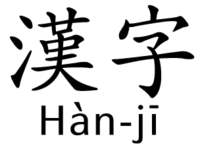Hàn-jī
| Hàn-jī | |
|---|---|
 | |
| Type | |
| Languages | Hokkien (Southern Min) |
Parent systems | |
Sister systems | Kanji, Hanja, Zhuyin, Traditional Chinese, chữ nôm, Khitan script, Jurchen script |
 |
| Written Hokkien |
|---|
| Hàn-jī |
| Si̍p-ngó͘-im |
| Lô-má-jī |
| Mixed script |
| Other transliterations |
| Lists |
Hàn-jī is the Hokkien name for Chinese characters. More specifically, it refers to those Chinese characters originated or borrowed from Chinese and incorporated into the Hokkien language with Hokkien pronunciation. The system has been using for hundreds of years, and Hoklo people had to learn Classical Chinese (hàn-bûn), which has to be read in literary readings, to be properly literate for the most part; however, Hokkien does have its own vernacular which is built up by its sinoxenic and native phrases. The earliest Hokkien vernacular literary written in hàn-jī is Tân Saⁿ and Gō͘-niû in Ming dynasty, and koa-á-chheh is also an important kind of hàn-jī vernacular literature in the history of Hokkien language.
See also[edit]
| This writing system-related article is a stub. You can help EverybodyWiki by expanding it. |
This article "Hàn-jī" is from Wikipedia. The list of its authors can be seen in its historical and/or the page Edithistory:Hàn-jī. Articles copied from Draft Namespace on Wikipedia could be seen on the Draft Namespace of Wikipedia and not main one.
